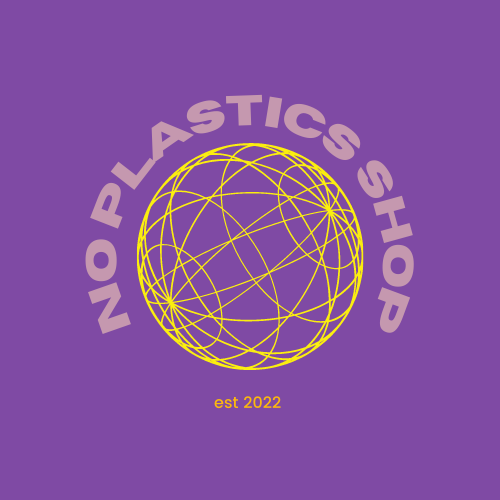Sustainable Alternatives to Ziploc Freezer Bags – for Freshness Without Waste
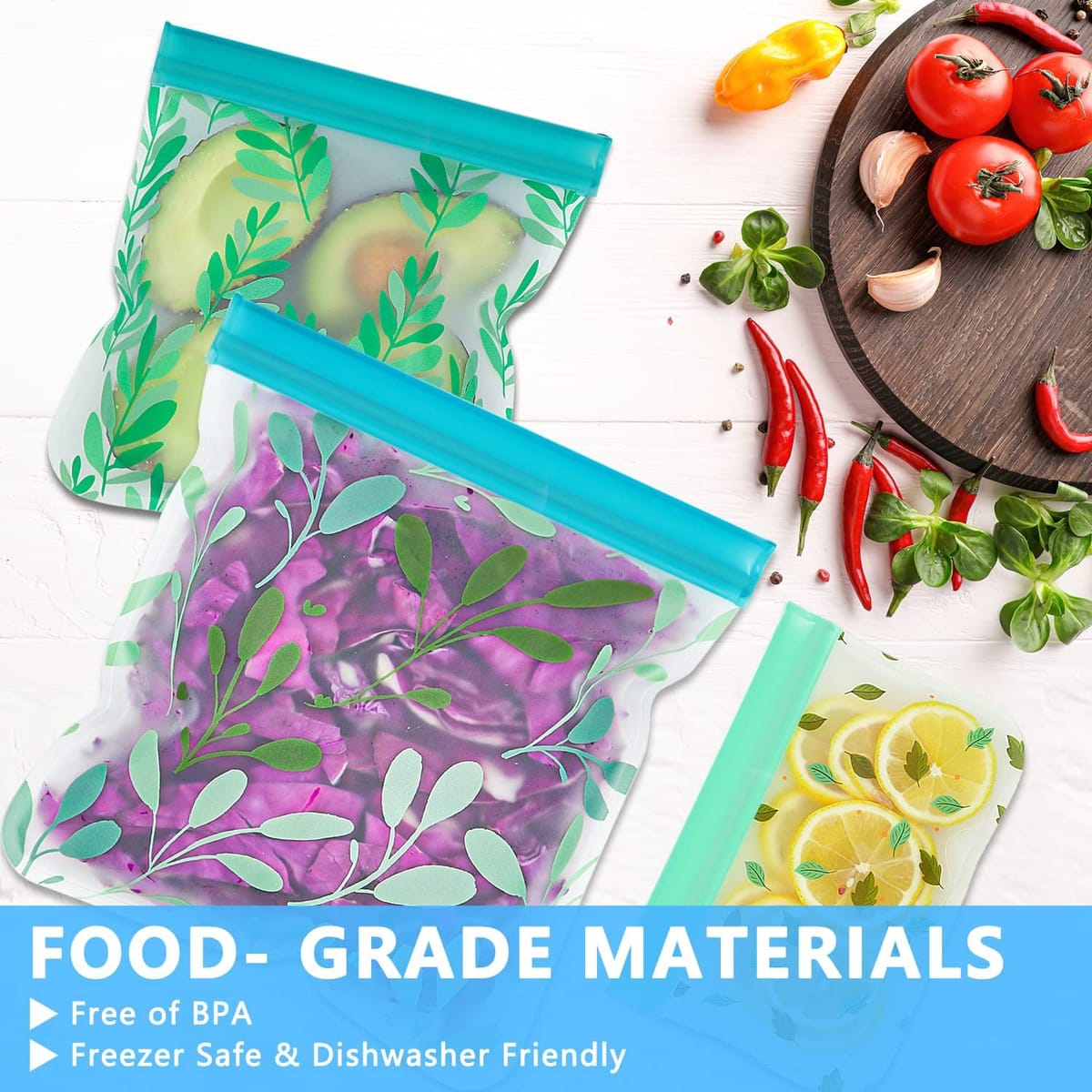
Plastic Ziplock Bags: Who's Responsible?
Ah, those pesky plastic ziplock bags. Who would have thought that a simple invention intended to keep our food fresh would become one of the biggest contributors to environmental pollution today? Well, the answer lies with two gentlemen by the name of Borge Madsen and Peter Rausing.
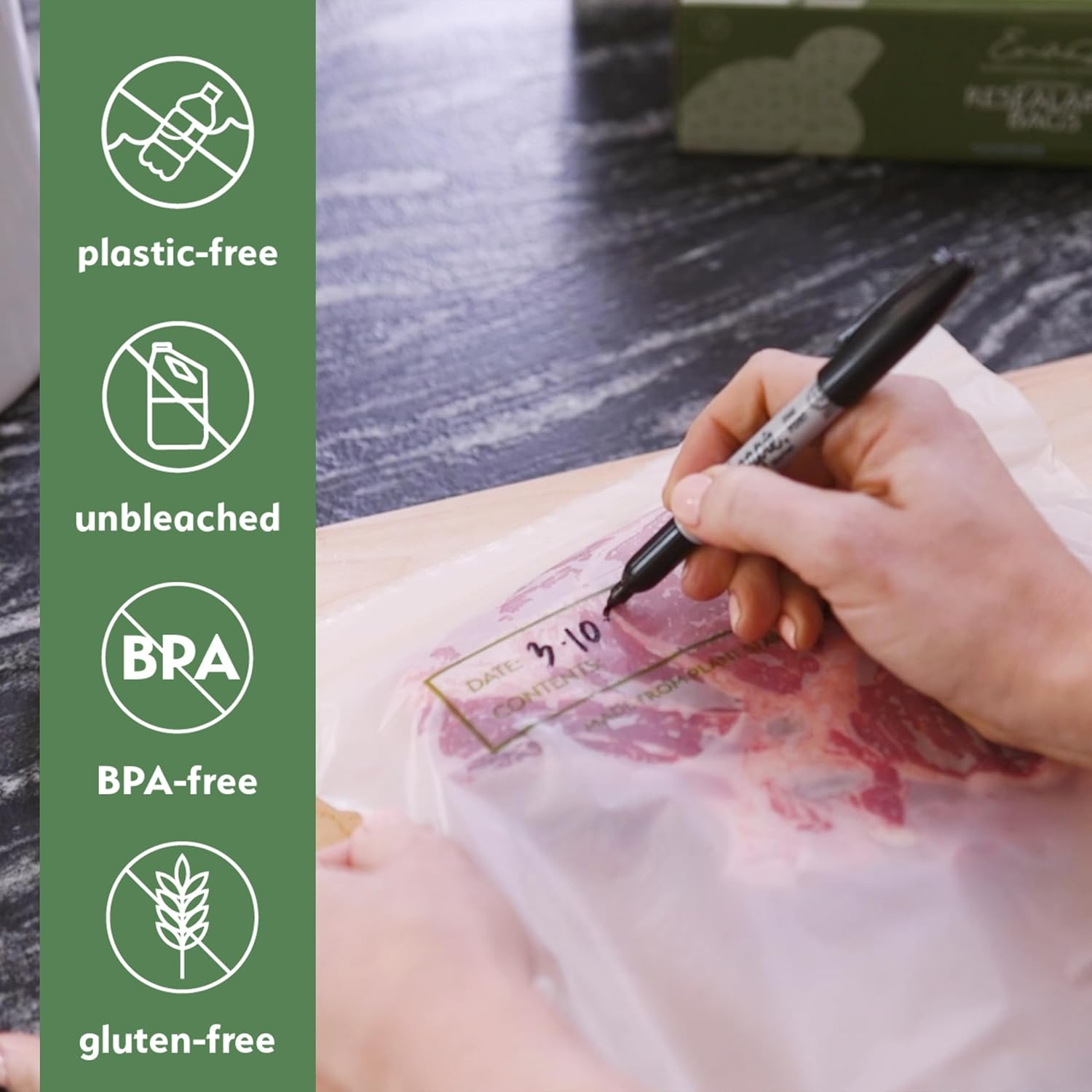
Earth Natural Alternative Store. Compostable Ziploc Alternative
In 1951, Madsen, a Danish electrical engineer, and Rausing, a Swedish entrepreneur, founded the company Tetra Pak. The company's initial invention was packaging for liquid food items, such as milk and fruit juices, using paper and aluminum.
However, in 1954, Madsen came up with the concept of a plastic zipper seal to replace the traditional metal clasp used in food packaging at the time.
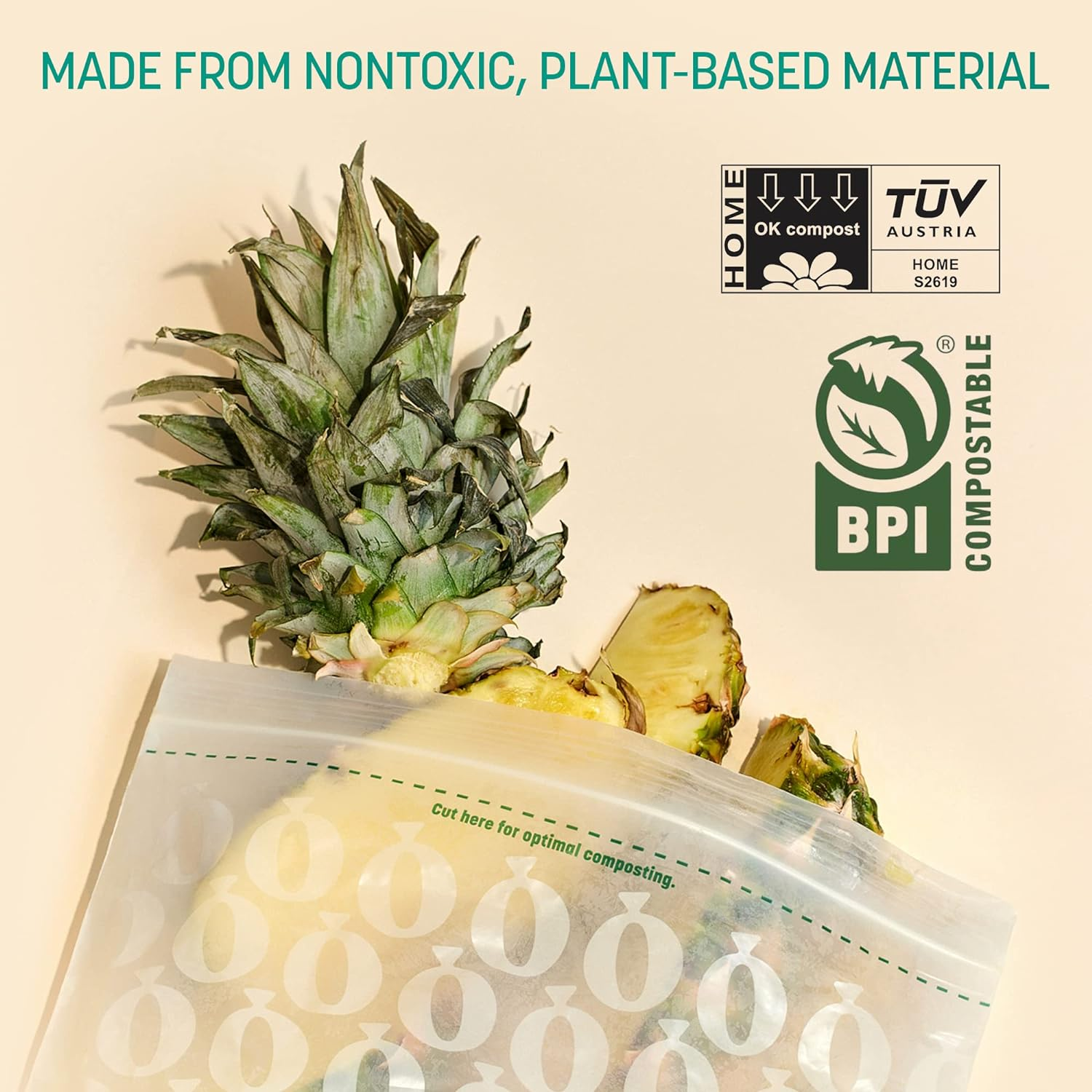
Although a revolutionary invention at the time, little did they know that their little plastic pouch would become a major contributor to the plastic pollution epidemic that we face today. In fact, Americans alone use over 100 billion plastic bags per year, most of which end up in landfills or oceans.
True Eco Friendly Alternatives
But fear not, as the quest for a better, more environmentally friendly bag has been ongoing. Several companies have come up with innovative solutions such as biodegradable bags made entirely from plant materials, such as cornstarch or vegetable oils. These bags biodegrade naturally and do not release harmful toxins into your food or the environment.
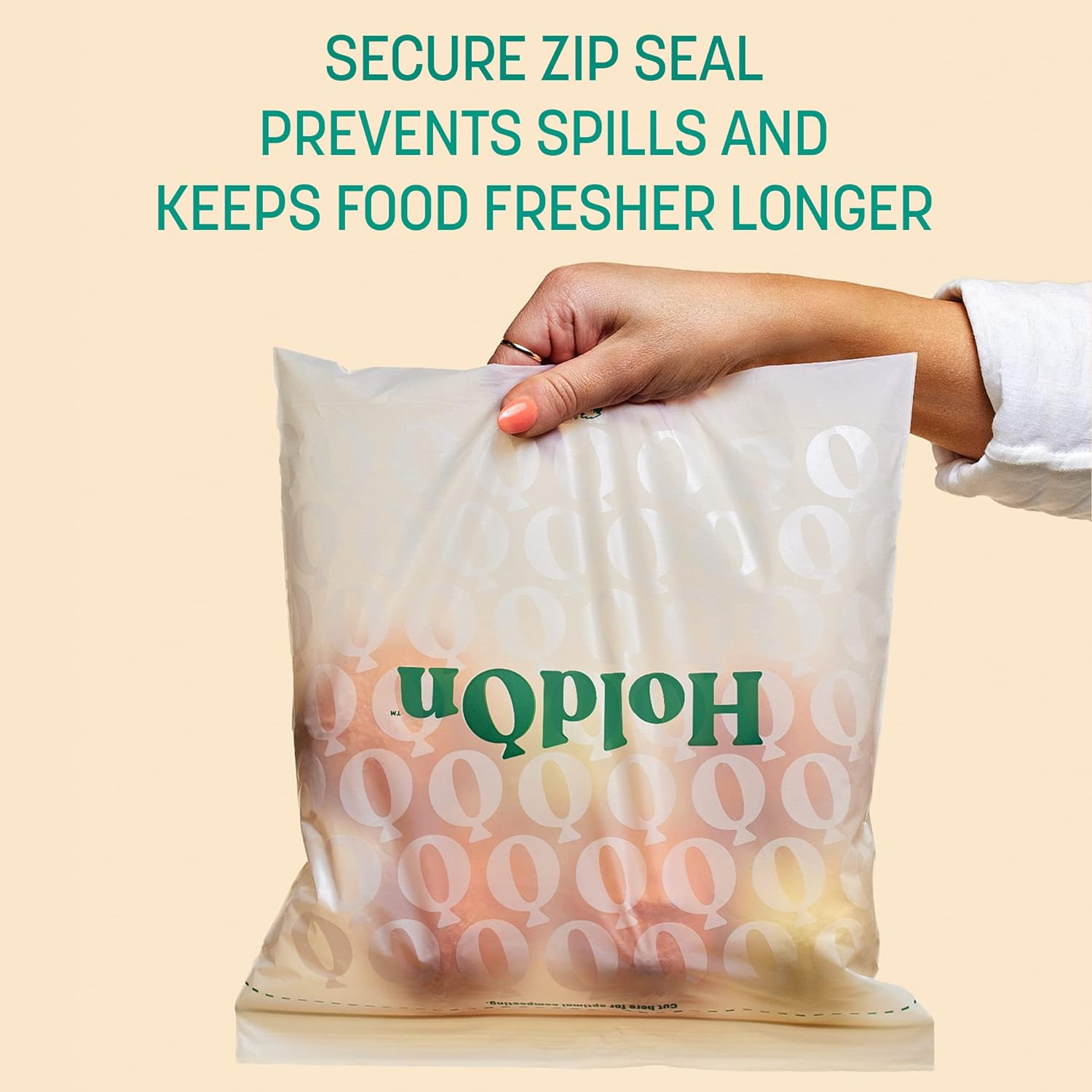
HoldOn Store. Alternative to Ziploc Bags
So, while Madsen and Rausing may have inadvertently created a monster in the form of plastic ziplock bags, there's still hope for a brighter, cleaner future.
Let's all do our part and switch to biodegradable ziploc bags eco friendly, for our food storage needs. Mother Earth will thank us, and our food will stay fresh, too!
For ZERO WASTE SNACK BAGS SIZE Go Here
The Recycling Myth : Who's Responsible?
Looks like we have ourselves more than a little case of political and plastics industry corruption totally derailing our recycling efforts. They don't give a damn about the health of our planet or the future of our children. But hey, as long as they keep lining their pockets with cash, right?
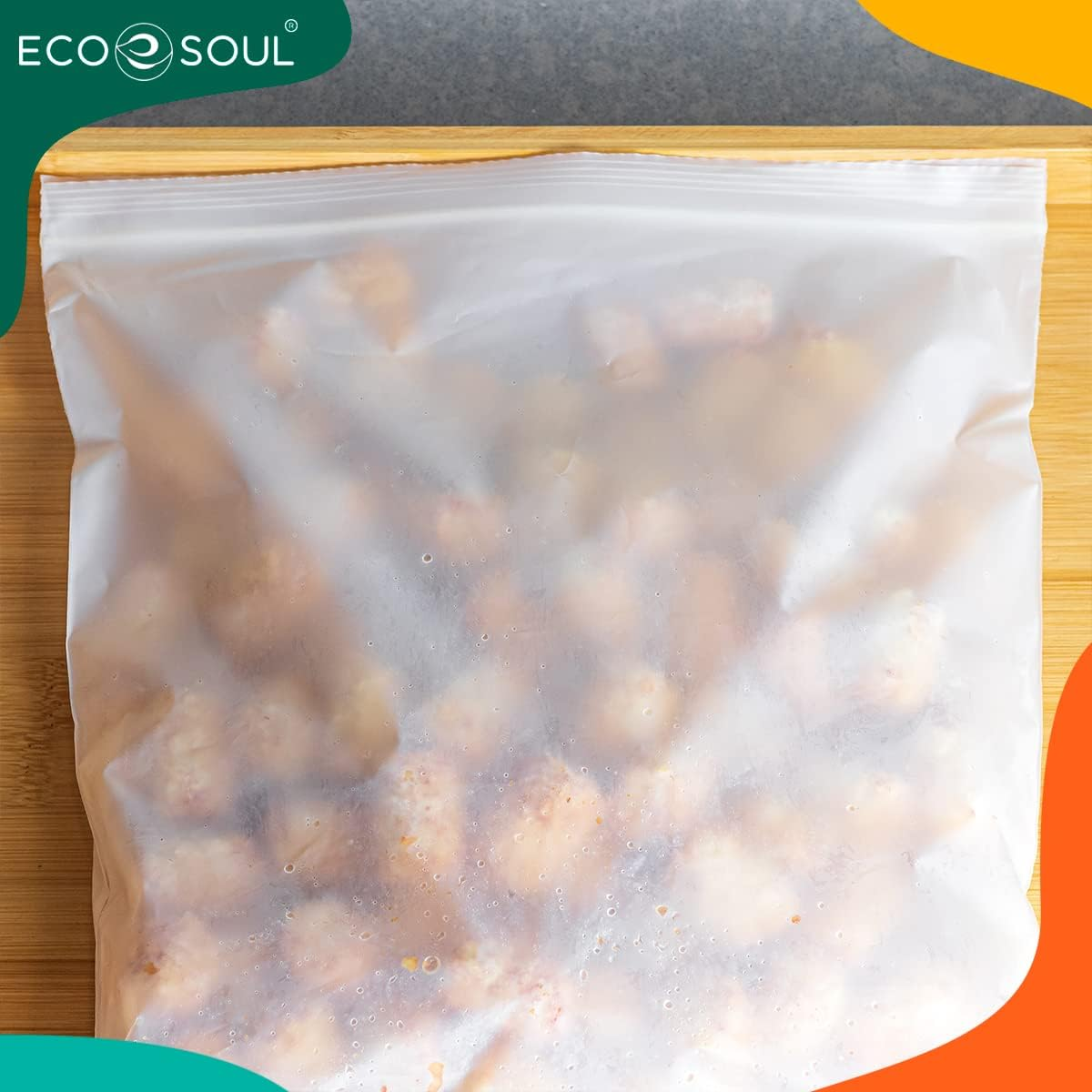
Eco Soul Store Plastic Free alternatives to ziploc bags
I don't know about you, but I've noticed more and more plastic food containers sneaking its way into daily life. And while they're incredibly convenient for on-the-go lunches and meal prepping, it's becoming almost impossible to find a place to properly recycle them.
It's like we're stuck in a never-ending cycle of plastic waste piling up in landfills, all thanks to the powers that be.
Did you know that approximately 91% of plastic isn't recycled, according to National Geographic? And that almost 50% of plastic comes from packaging alone?
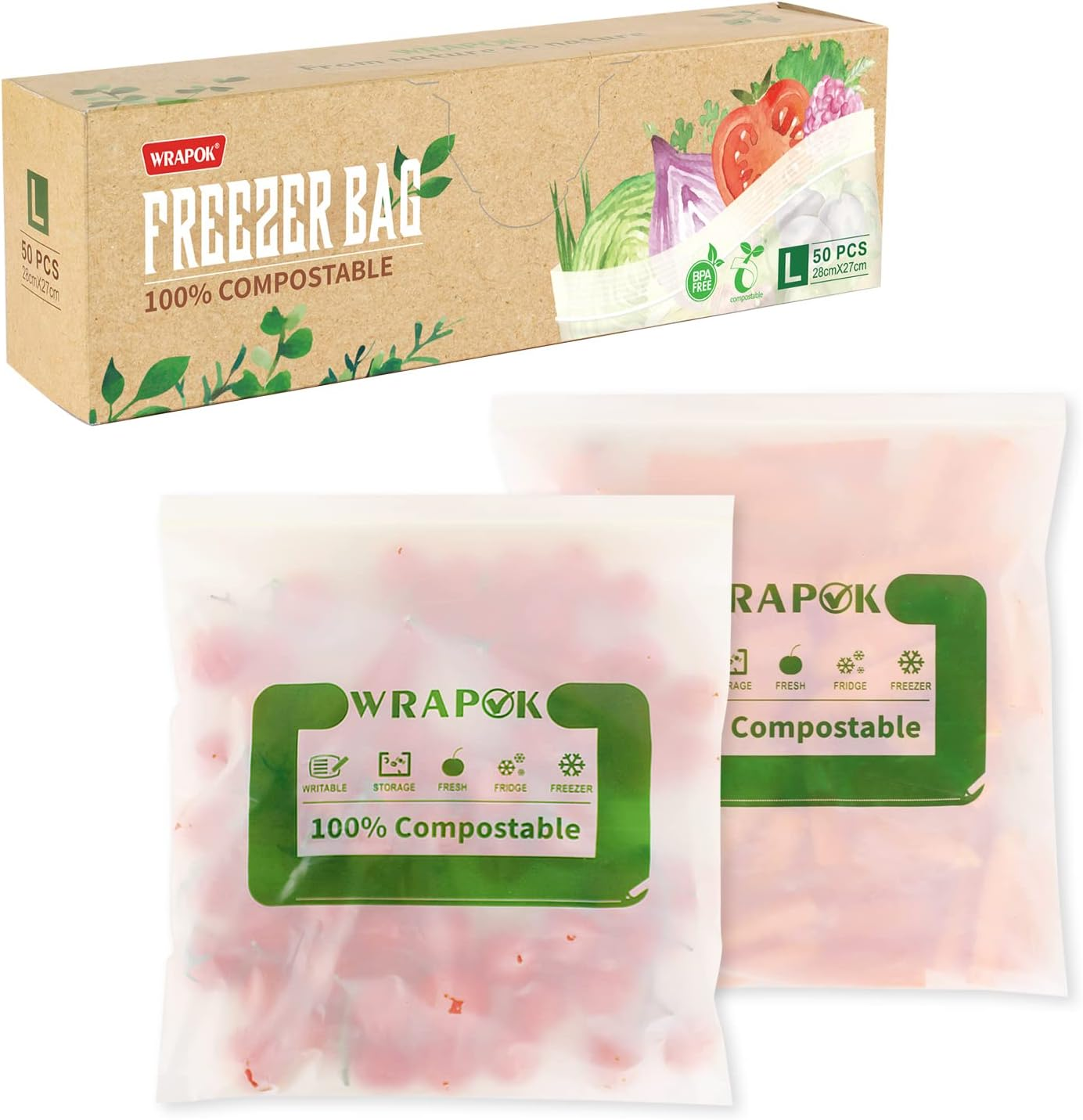
Wrapok. Has done the right thing with their Freezer Bags.
Sadly can't say the same for their Cling Wrap;(
We can start holding the powers that be accountable for their lack of action on this issue. It starts with demanding better from the plastics industry and exploring more sustainable options. And it definitely starts with educating ourselves and others on the importance of properly disposing of plastic waste.
Only 100% Plant-Based Food Wraps Are A Sustainable Alternative To Plastic Ziploc Bags
In the absence of recycling options, consumers cam do our part by reducing our plastic use and avoid as much plastic food containment as possible. Who knows, maybe we can turn the tide on this plastic disastrophe yet.
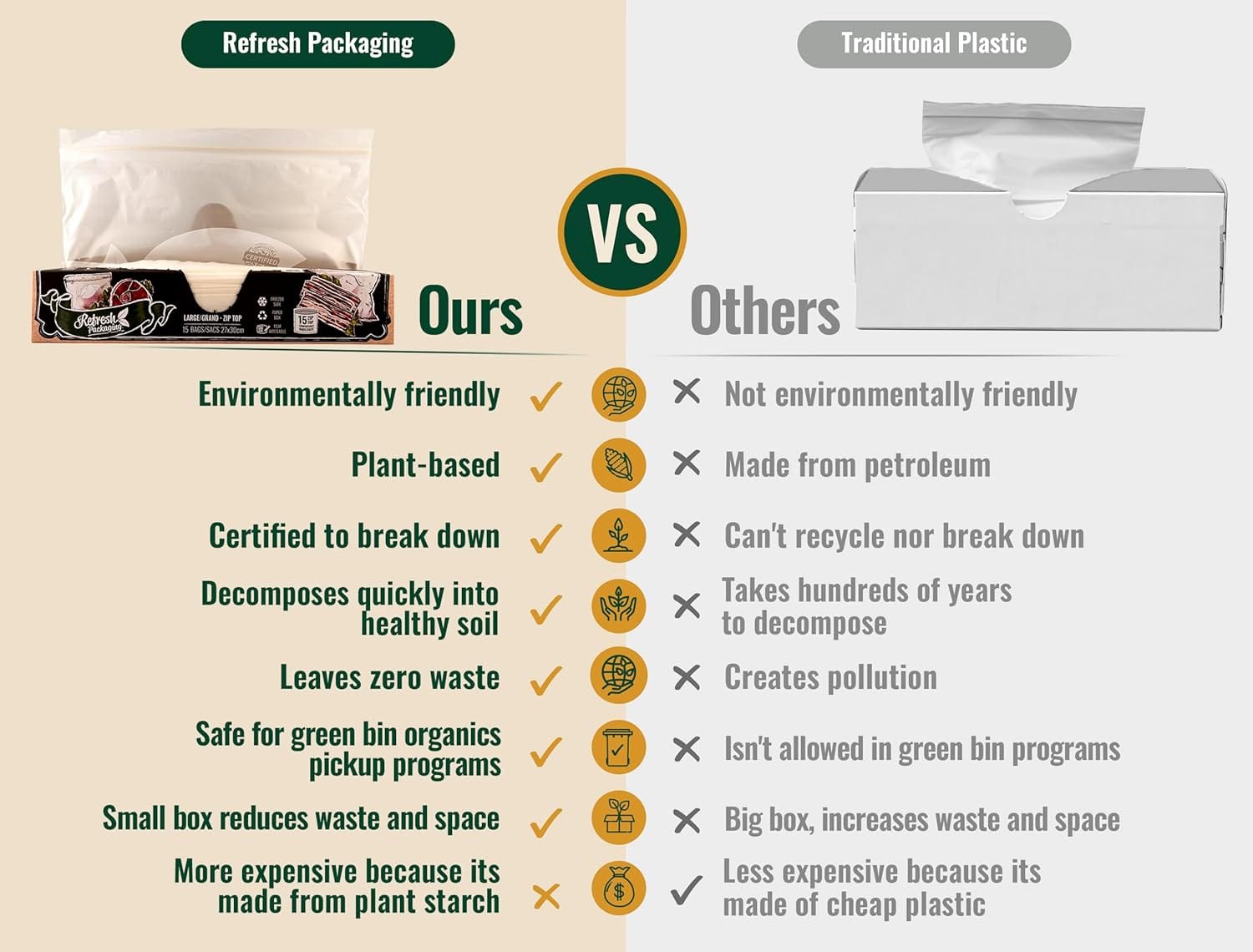
Refresh Packaging Store 100% plant based materials
False Eco Friendly Freezer Bag Brands
That's right, plenty of brands with misleading eco-sounding names like Greenzla, Cleanomic, Compostic, and Ecoopts. All with the audacity to tout their products as earth-friendly, even compostable, freezer safe when they are anything but.
For Plastic Free Sandwich Size Lunch Bags Go Here
Loaded with PBAT's or other hidden plastics. Others, like the Matter Store are simply unclear about their labeling. Another very common, very nasty freezer bag material is PEVA.
The Hazards Of PEVA
Oh, PEVA, you sly devil. You may seem innocent enough, with your promise of a "safer" alternative to traditional PVC plastic in our beloved freezer bags, and other food storage containers. But alas, you are just another example of hidden plastic in our everyday consumer products.
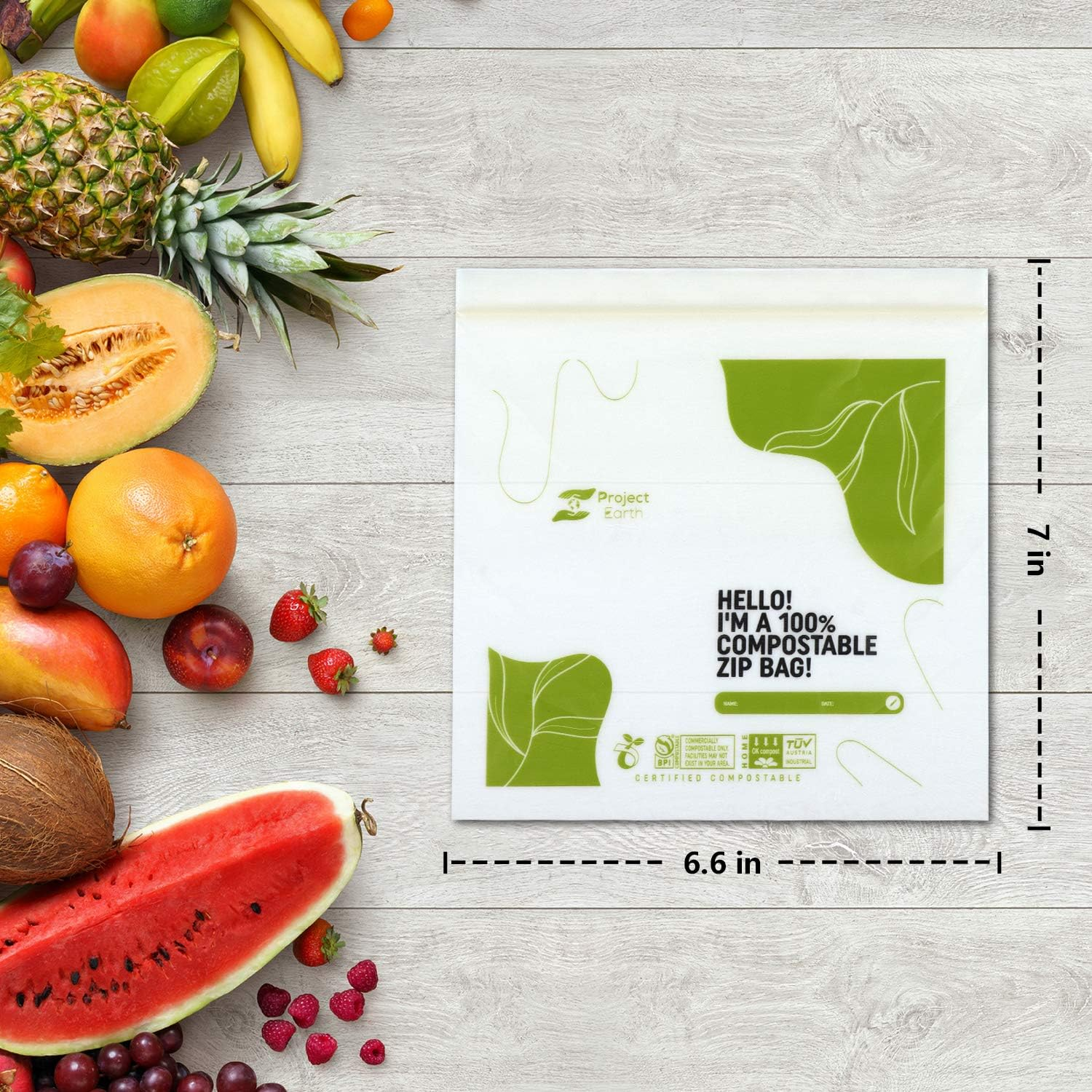
Project Earth non plastic ziploc bags
Sure, PEVA may not contain the harmful chemicals found in PVC, such as phthalates and lead. But let's not forget that PEVA is a type of plastic, and plastic doesn't just magically disappear into thin air. It ends up in our landfills, oceans, and even in the air we breathe.
PEVA hazards also include the potential for leaching chemicals into our food over time. Studies have shown that even "safer" plastics like PEVA can break down and release harmful substances, especially when exposed to heat or acidic foods.
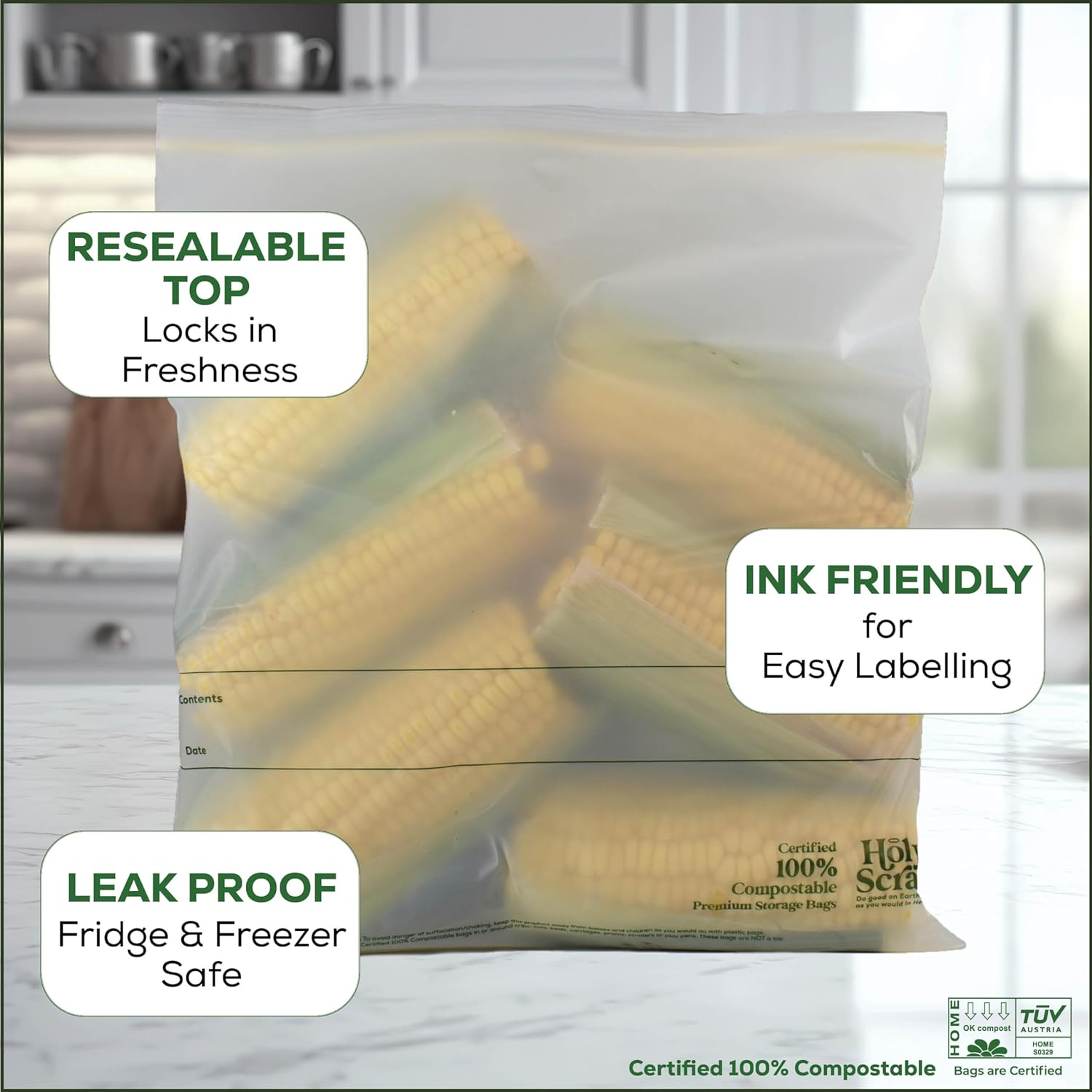
Holy Scrap Company. Excellent Brand, makes Garbage Bags Too!
So, while PEVA may seem like a step in the right direction, let's not kid ourselves. It's time to take a stand against hidden plastics in our consumer products and opt for more sustainable and eco-friendly alternatives. Because, let's face it, Mother Nature deserves more than just a plastic wrap-filled freezer bag.
Beeswax Wraps : A Good Ziploc Alternative
The increasingly popular, colorful option of beeswax bags are good for many food storage freezer applications. Good as reusable sandwich bags too!
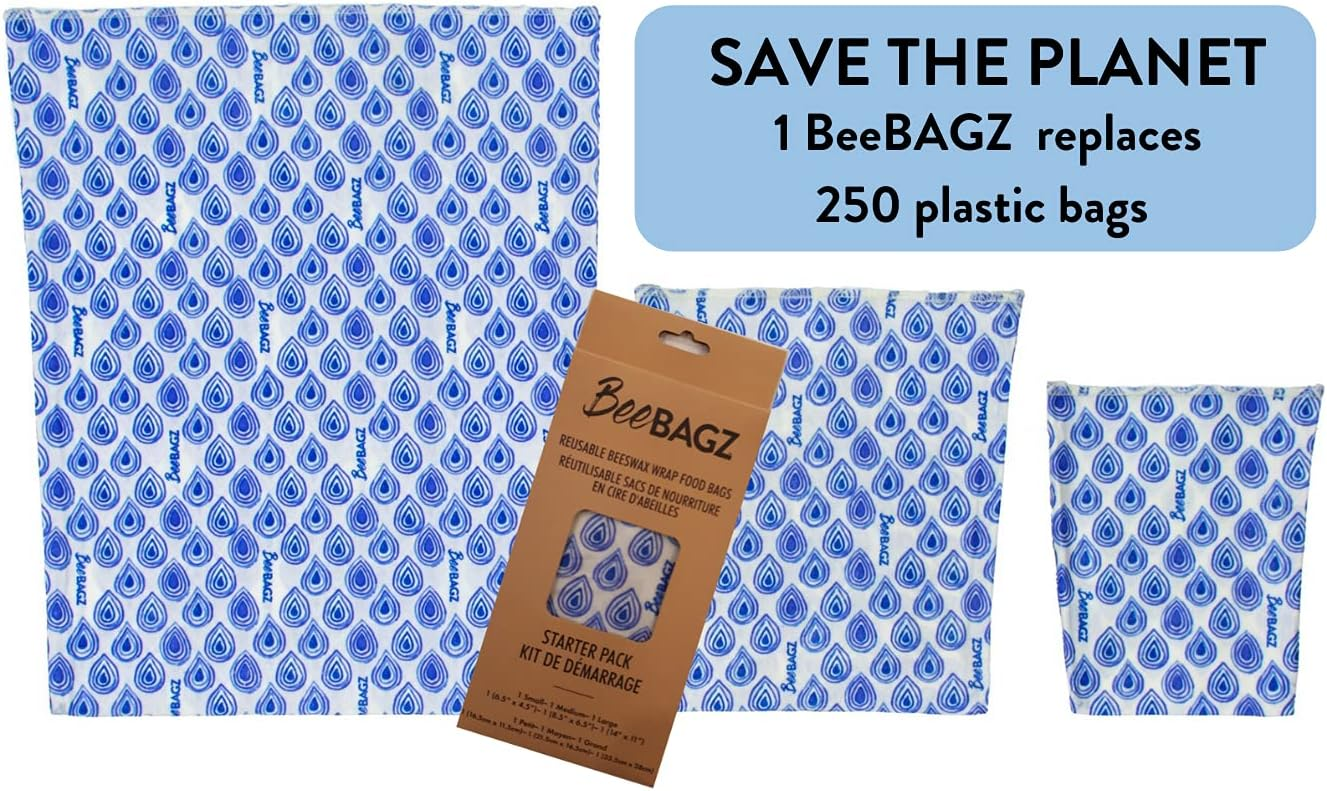
BeeBAGZ
For Sandwich Size – Reusable Beeswax Food Wraps Go Here
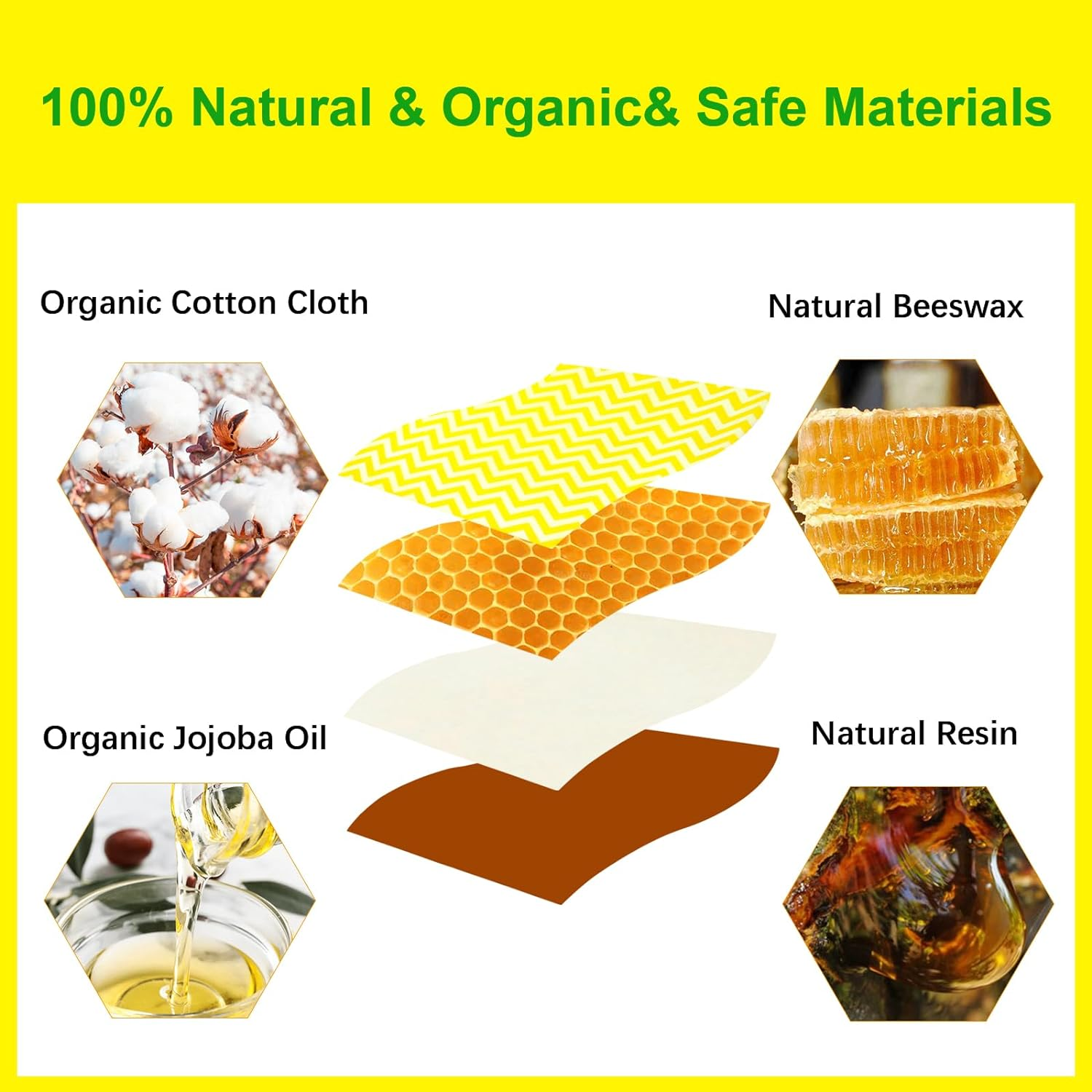
Envoltura Verde. Beeswax Wraps, combined with organic cotton
Why Choose Eco-Friendly Alternatives to Ziploc Bags?
Why settle for Ziploc plastic bags and freezer bags when you can go green and make a real difference for the planet? It's time to ditch those sneaky plastic-laden imitations and choose eco-friendly alternatives that are good for both your health and the environment. Here's why:
Firstly, the hidden presence of plastics in false eco-friendly brands is a big problem that cannot be ignored. Not only do these plastics contribute to the toxic pollution of our oceans and waterways, but they can also seep into your food and harm your health over time. So why risk it?
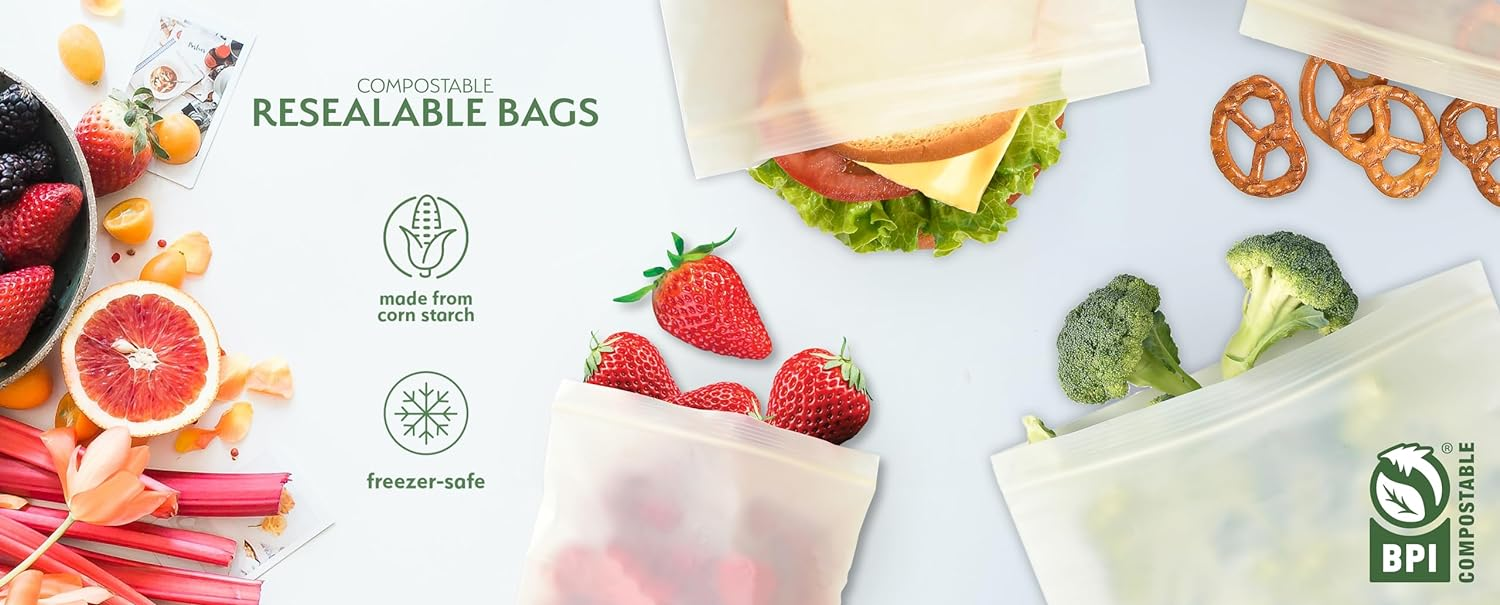
Earth Natural. plastic free food storage
Secondly, the production of traditional freezer bags requires an obscene amount of fossil fuels and non-renewable resources, making it an incredibly unsustainable industry.
By choosing eco-friendly freezer bag alternatives, you can help reduce your carbon footprint and support companies that are doing their part to combat climate change.
And let's not forget the financial benefits of switching to eco-friendly alternatives. While they may seem like a pricier option up front, they are often made from more durable and long-lasting materials.
This means you'll save money in the long run by storing food and not constantly having to replace flimsy plastic bags.
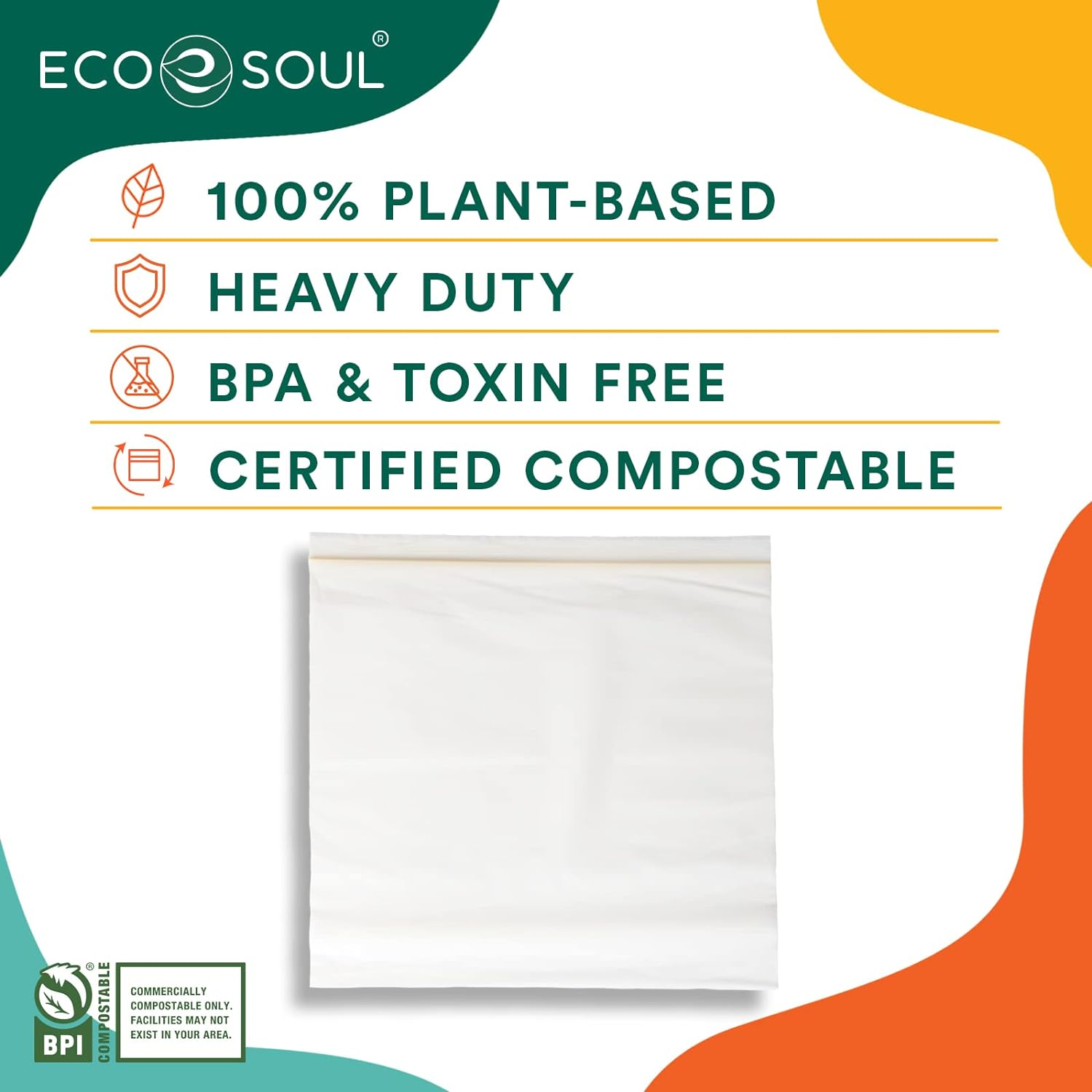
Eco Soul. eco friendly ziploc bags
So don't be fooled by false eco-friendly brands. Make the choice to go green with high-quality, sustainable, and toxin-free alternatives. Your health and the planet will thank you.
Responsible Products Certified Compostable Bags
What are Certified Compostable Products? We are talking about those eco-friendly products that not only fulfill your daily needs but also contain no PBAT or other hidden plastic – just pure, organic goodness!
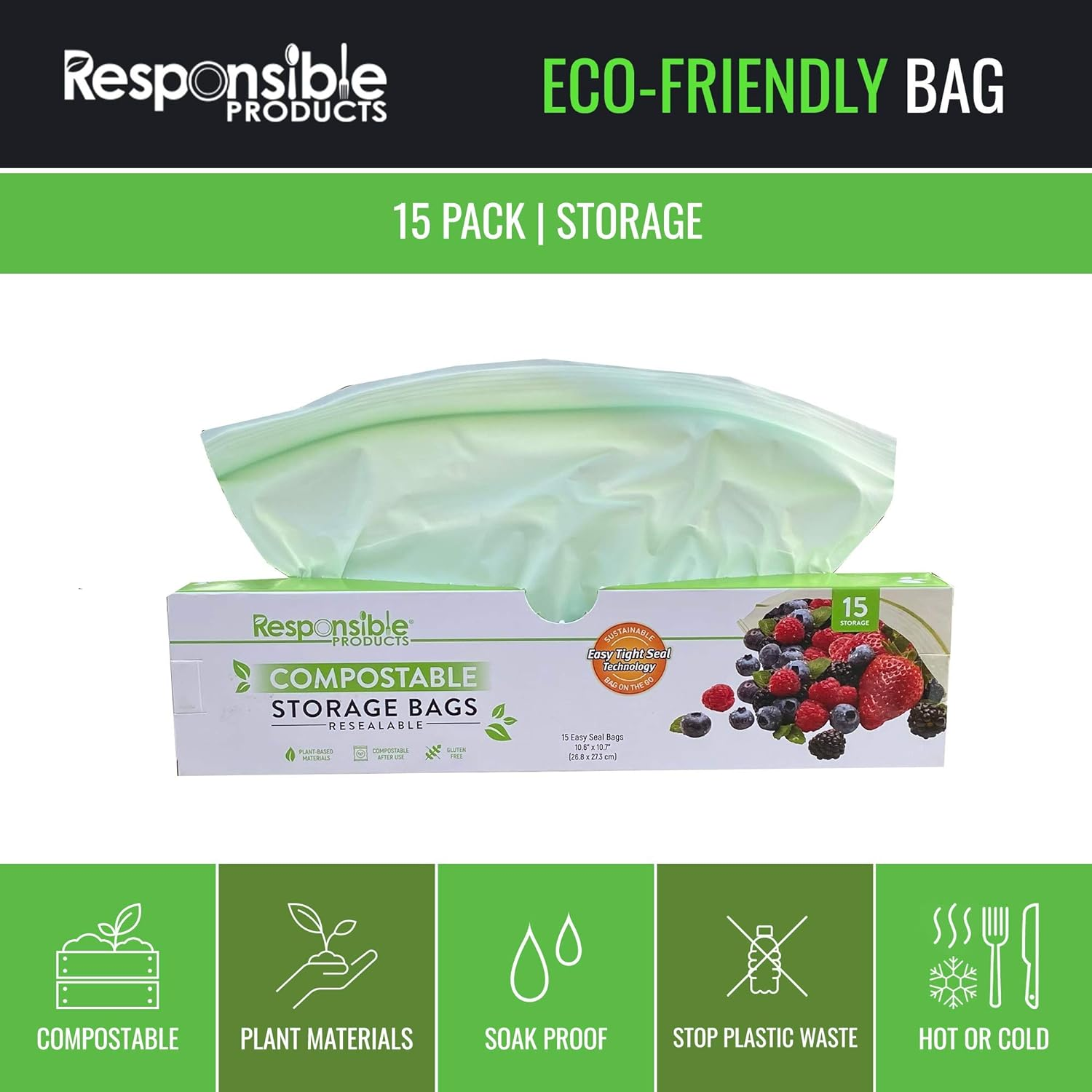
Responsible Product Store. BPI certified
How can we guarantee that these products don't have any PBAT or other plastic forms? It helps tp look out for the BPI (Biodegradable Products Institute) certificate!
The BPI certificate is the holy grail of compostable products. It's a stamp of approval that assures you that a product is 100% compostable and contains no harmful ingredients that could harm the environment. In other words, it's your best bet for identifying truly eco-friendly products.
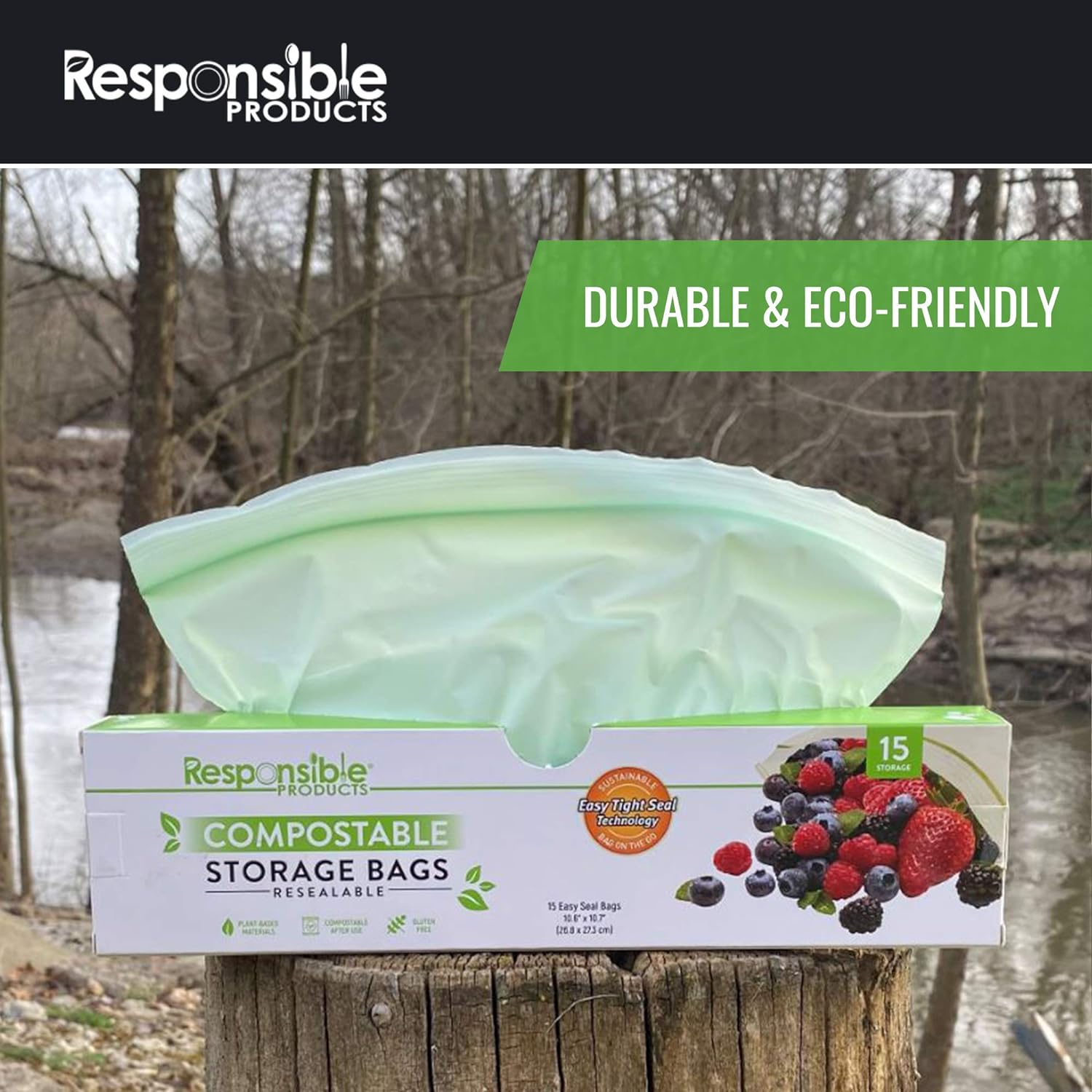
So, why settle for products that may harm the environment when you can opt for the BPI-certified ones? After all, we only have one planet, and it's our responsibility to take care of it. So switch to Certified Compostable products and encourage others to do the same. Remember, a small step today can make a big difference tomorrow!
How Are Ziploc Bags Bad For The Environment?
First and foremost, Ziploc bags are made from a concoction of plastic polymers, some of which may include PBAT (Polybutylene Adipate Terephthalate) or other sneaky forms of plastic hiding in plain sight.
PBAT is marketed as a “biodegradable” plastic, but the reality is that it only breaks down under specific industrial composting conditions, which isn't exactly commonplace for the average consumer. In other words, don't be fooled by greenwashing tactics!
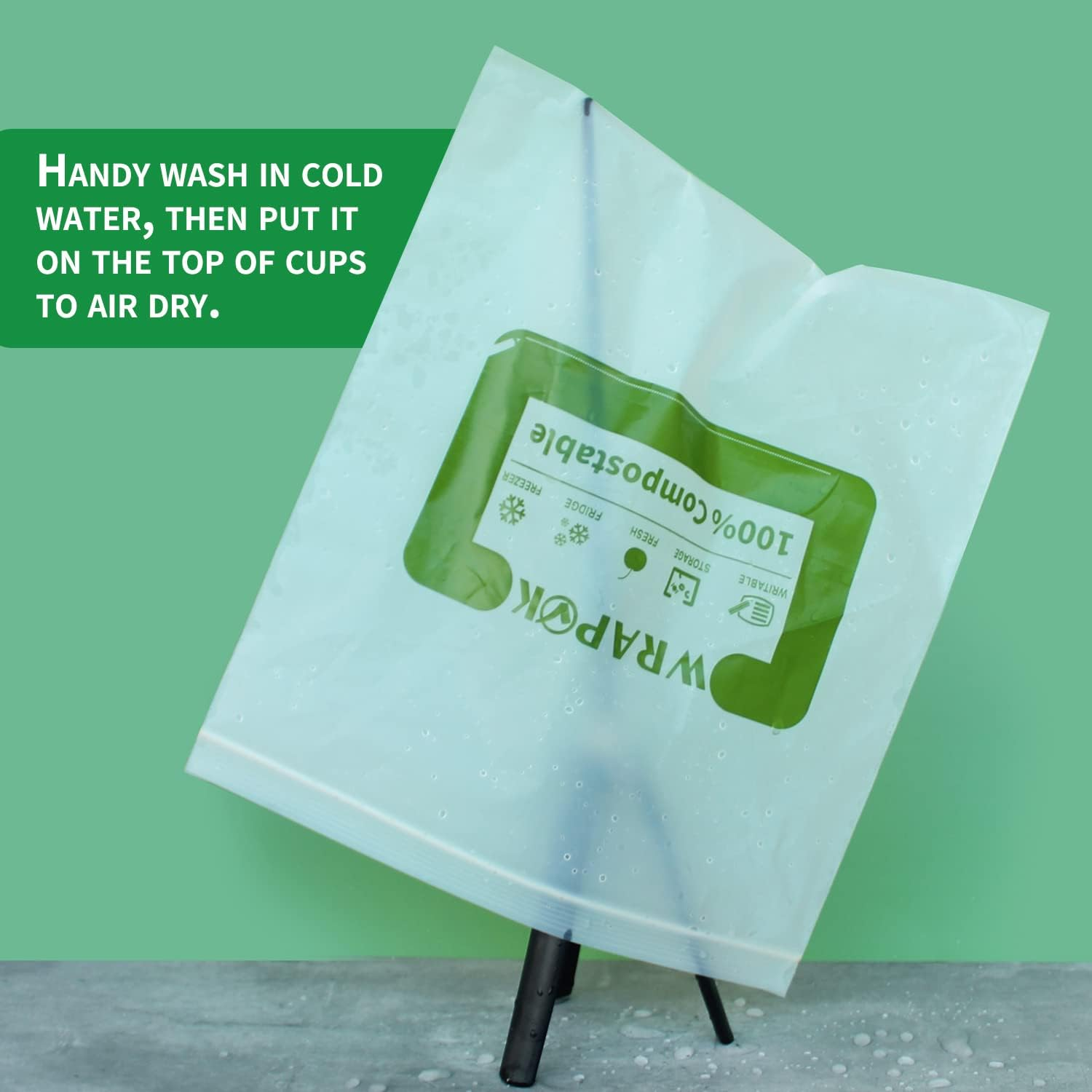
Wrapok. reusable ziploc bags, plastic free!
Secondly, these bags are one-time-use disposable items, meaning that they end up in the trash after just a single use. And where does that trash go? Landfills.
Plastics don't biodegrade, they photodegrade, breaking down into smaller and smaller pieces over time, eventually creating microplastics that end up in our soil, water, and even our food. Yum.
Ziploc bags are also incredibly energy-intensive to produce. They require a significant amount of fossil fuels to create, contributing to greenhouse gas emissions and exacerbating climate change.
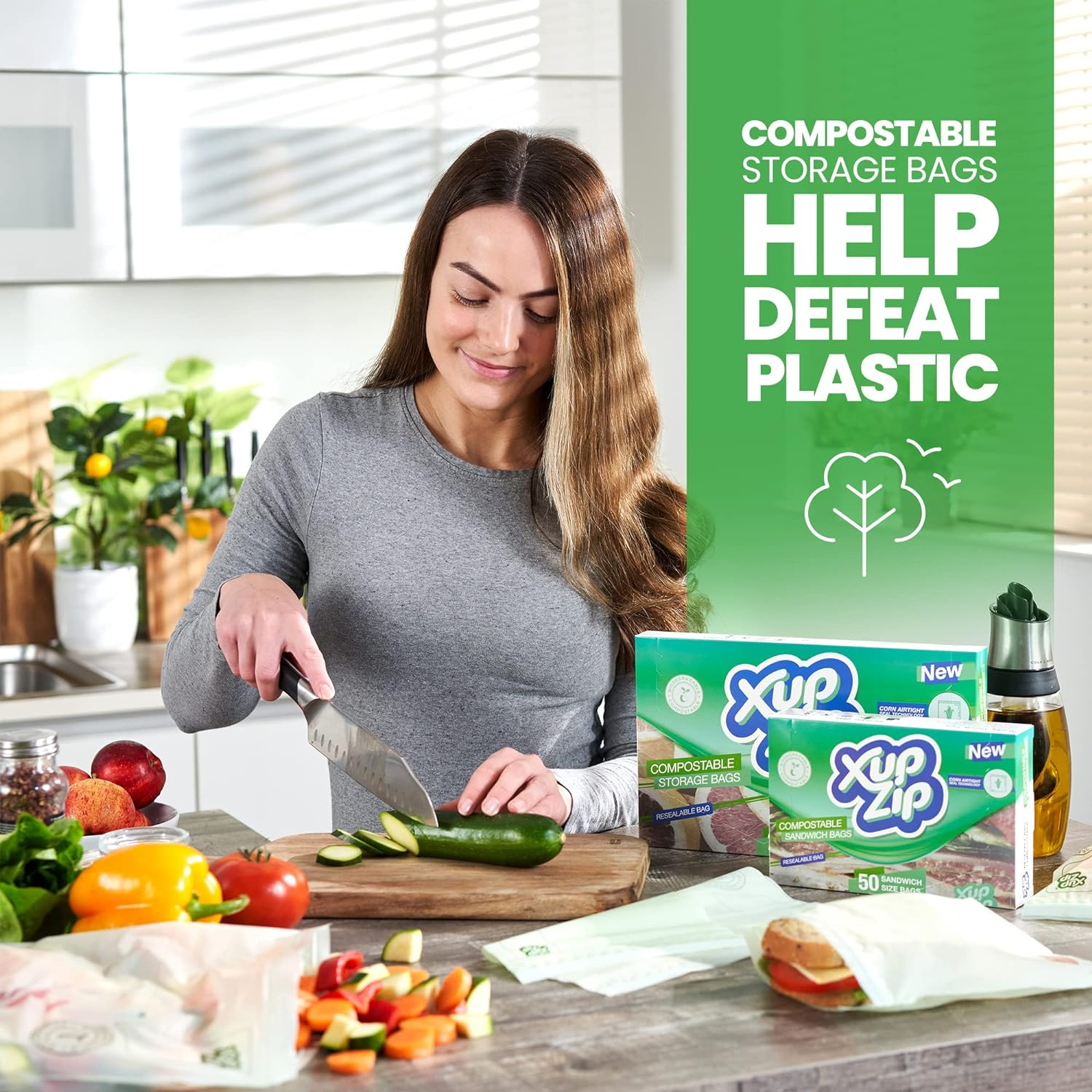
So how can we be sure that a product contains no PBAT or other hidden forms of plastic? The truth is, it's not always easy. But as a general rule, opt for products that use clear, simple labeling and avoid expressions like “bio-based” or “compostable” that can sometimes be misleading.
Why Is It Impossible To Recycle Our Plastic?
On one hand, we have the political bigwigs. It's no secret that the plastics industry greases their palms with a hefty amount of cash, in exchange for laws and regulations that favor their profit margins.
And let's not forget the cozy relationship between certain politicians and lobbyists, which only serves to perpetuate the cycle of corruption. So, yeah, they definitely have a hand in the current state of affairs.
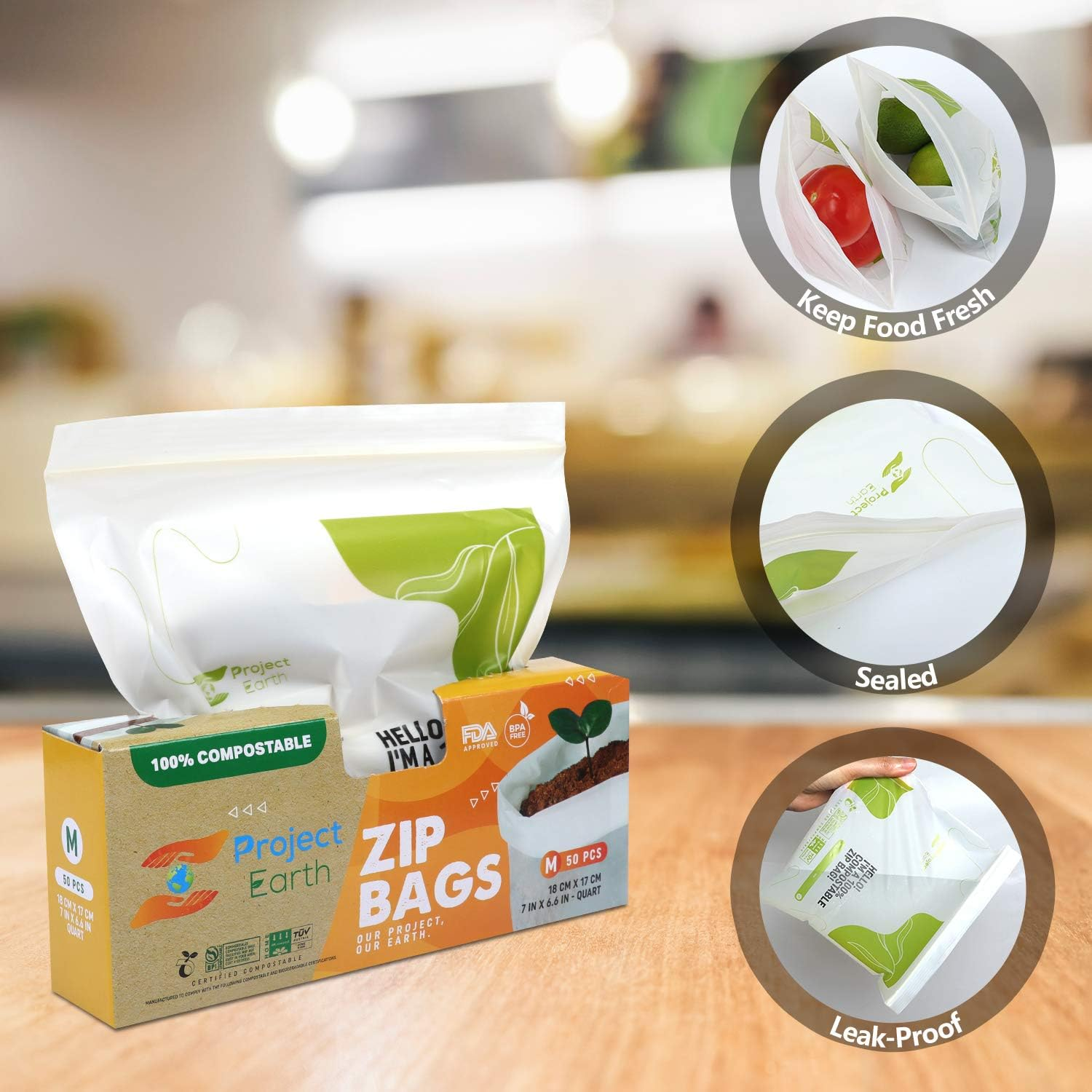
On the other hand, the plastics industry itself can't escape culpability. They've been pushing single-use plastics down our throats for decades, despite knowing the environmental havoc it wreaks.
And instead of investing in sustainable alternatives or better recycling infrastructure, they've chosen to spend money on ad campaigns that tout their "recyclable" products. Except, as we all know now, most of those products don't get recycled at all.
Of course consumers give these bigwigs and industry leaders the power they wield. We're just as much a part of this mess as they are. We've become so reliant on convenience that we've sacrificed the planet in the process. We buy all their plastic stuff without demanding why recycling rates are abysmal.
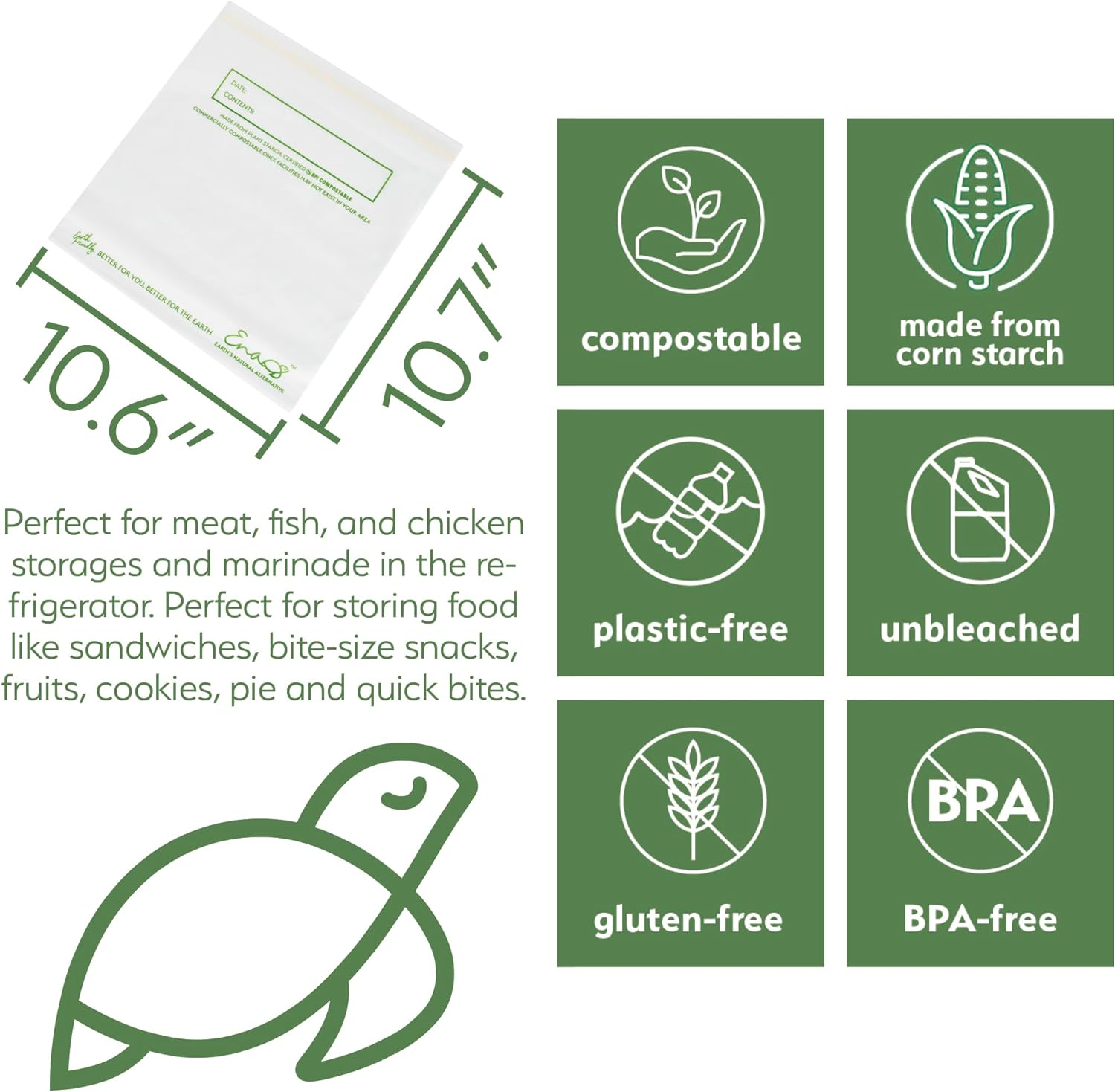
Earth Natural. freezer safe and durable
So it's a collective responsibility. Sure, some parties may bear more blame than others, but ultimately, we're all in this together. And until we start holding ourselves accountable and demanding change, the trash – and the responsibility – will keep piling up.
Reusable Silicone Bags
Lots of brands unfortunately mixing plastic in with their silicon bags. Make sure you get 100% silicon bags. The ultimate reusable bags for your freezer. Silicon reusable snack bags can be found on This Page
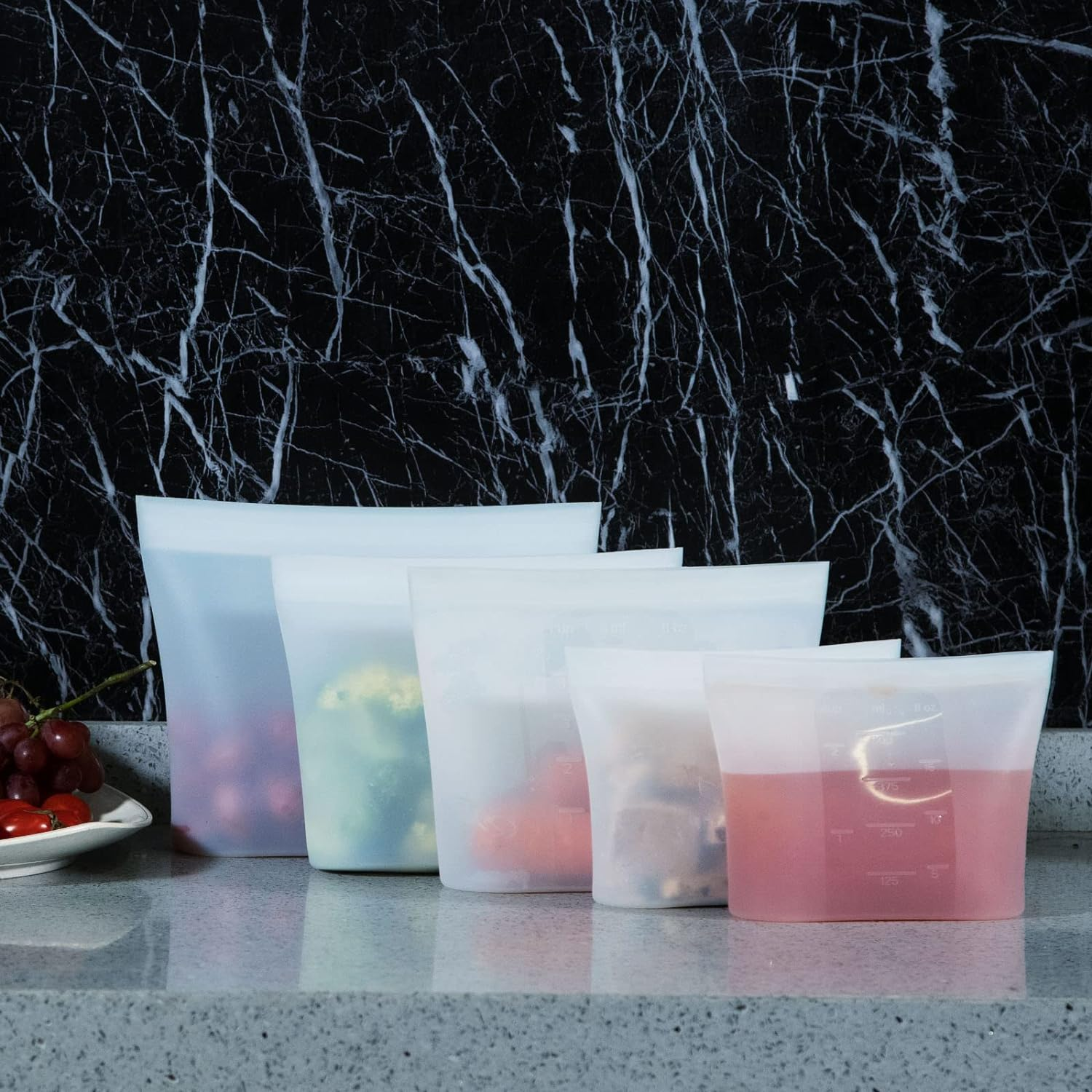
Winrock. microwave and dishwasher safe
Cool Bento Box Freezer Alternatives
Glass containers with bamboo, if you want a little more structure for your freezer food storage. And of course glass containers are dishwasher safe.
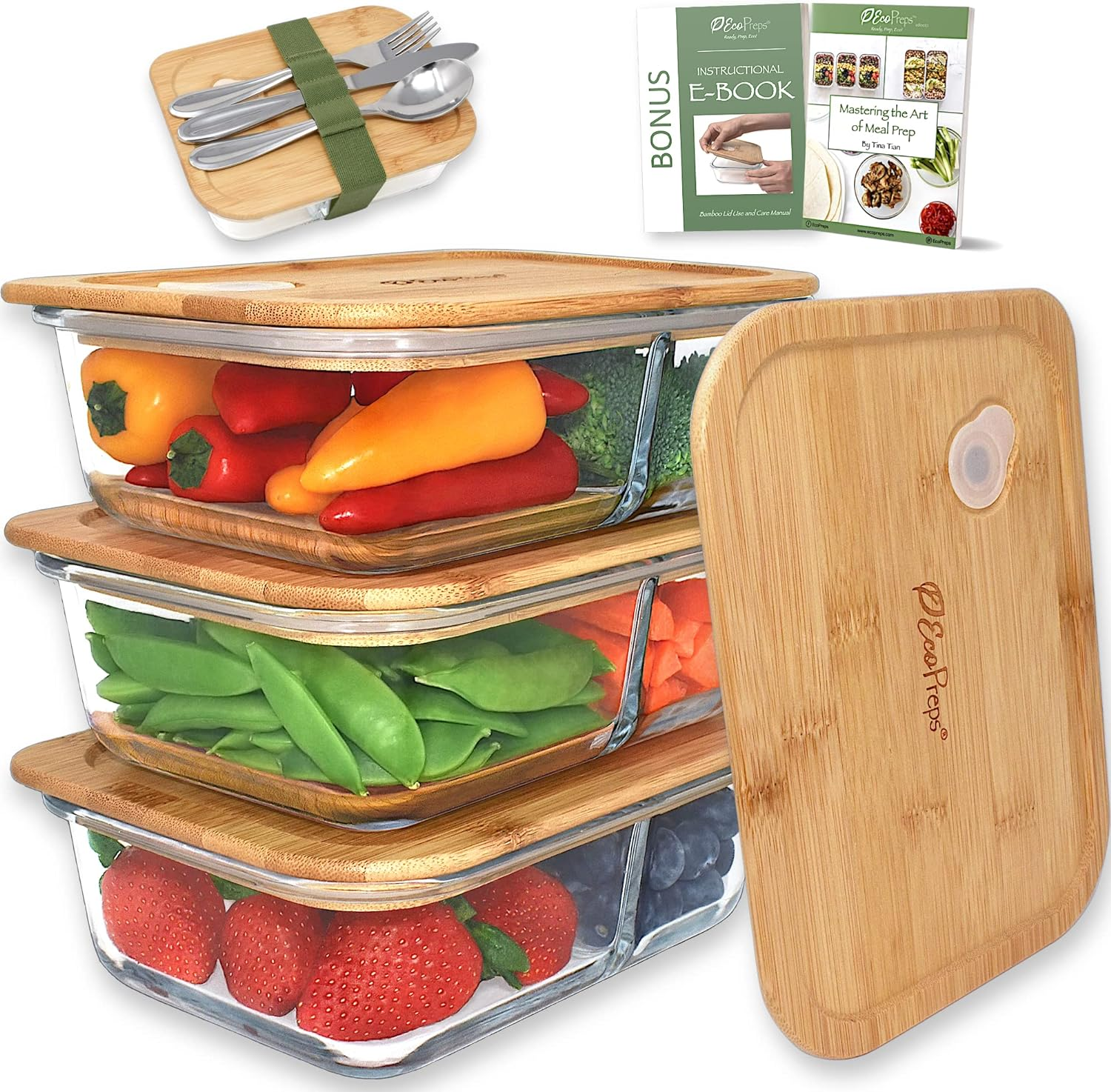
More Reusable Silicone Options
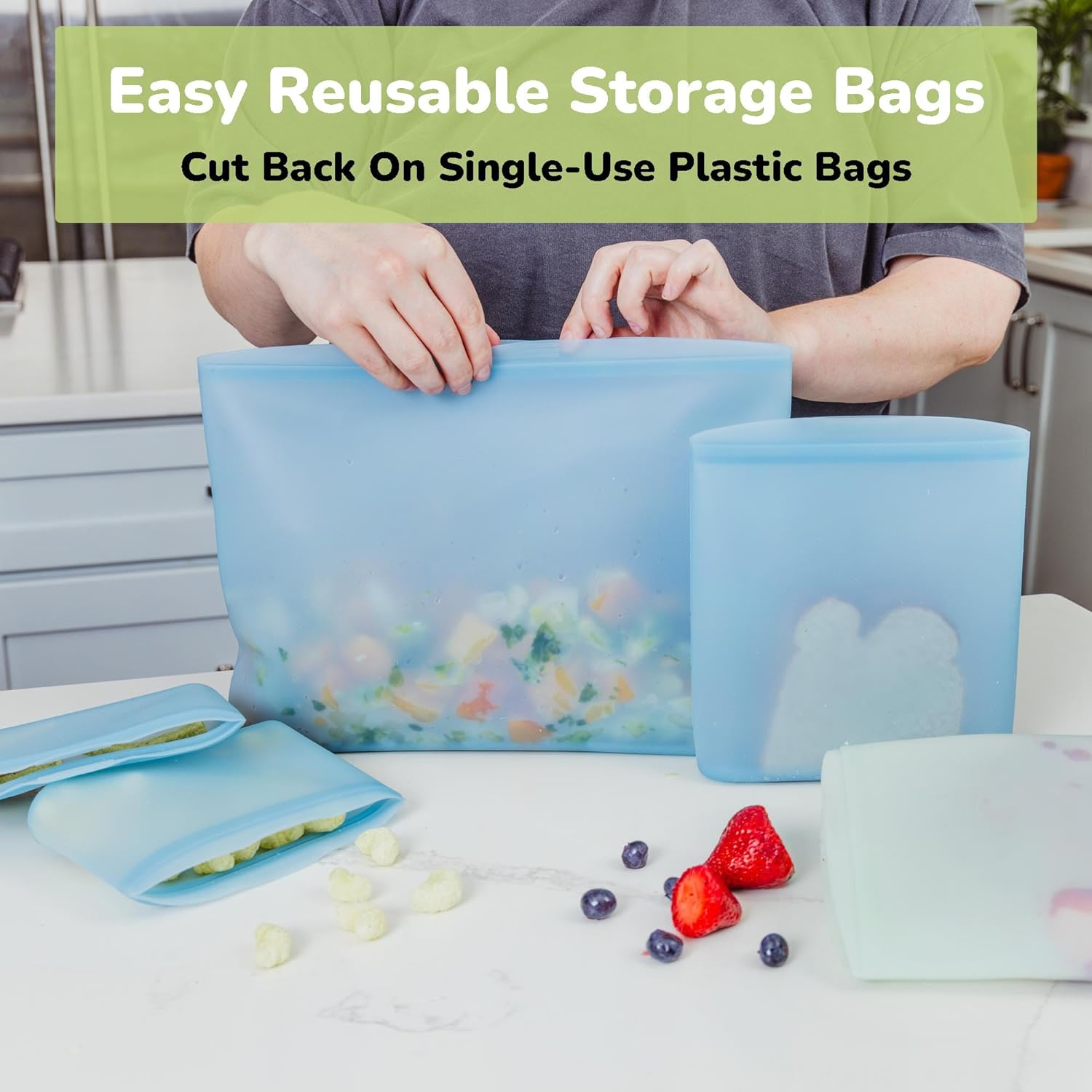
WeeSprout Store. 100% silicon bags
Wrapping Up Our Selection Of Ziploc Bag Alternatives
So don't be fooled by false eco-friendly brands. Make the choice to go green with high-quality, sustainable, and toxin-free freezer bags. Your health and the planet will thank you.
The next time you're about to toss that plastic food bag, think twice. While you're at it, give a nice little mental nudge to the plastics industry and corrupt politicians to start giving a damn about our future.
Used or worn bags at the end of their life can be tossed in your favorite Plastic Free Garbage Bag! No microplastics left behind.
FAQs
Are 100% plastic-free freezer bags just as strong and durable as plastic ziplocs?
Fortunately, these eco-friendly alternatives have been found to be just as strong and durable as their plastic counterparts, while also being compostable and biodegradable. So not only do they help reduce plastic pollution, but they also leave a much smaller carbon footprint. Making the switch to plastic-free freezer bags may seem like a small step, but it can have a big impact on our planet's health.
What is the problem with hidden plastics in many so-called “eco-friendly” freezer bags?
In an effort to reduce plastic pollution, many people have turned to "eco-friendly" products, such as compostable freezer bags. However, recent studies have revealed an alarming truth - many of these bags still contain hidden plastics that are not biodegradable or compostable. This defeats the purpose of using these bags in the first place, as they will still contribute to the growing plastic pollution crisis. It is crucial for manufacturers to be transparent about the materials used in their eco-friendly products and for consumers to do their research before purchasing. After all, small changes can make a big impact in the fight against plastic pollution.
Why has recycling plastic become so difficult in the United States?
Plastic pollution has become one of the most pressing issues of our time due to the massive amounts of plastic waste produced every year. Recycling plastic has become increasingly difficult in the United States mainly due to political and oil/plastic industry corruption. Money is the primary reason behind the lack of a seamless recycling system, which means that most of all plastic waste ends up in landfills, where it takes hundreds of years to decompose. And many consumers are not aware of this fact. International policies limiting the importation of certain types of plastic waste from foreign countries have resulted in the buildup of waste material in the United States. With the growing demand for plastic products and packaging, It is crucial that consumers increasing vote with our wallets until we find better leaders interested in solutions to the plastic waste problem, And make recycling of all plastic easier and more effective. It's not as if we don't have the technology.



